Interviews
Fantasia 2021: ‘Dreams on Fire’ Director Philippe McKie Interview
Published
3 years agoon
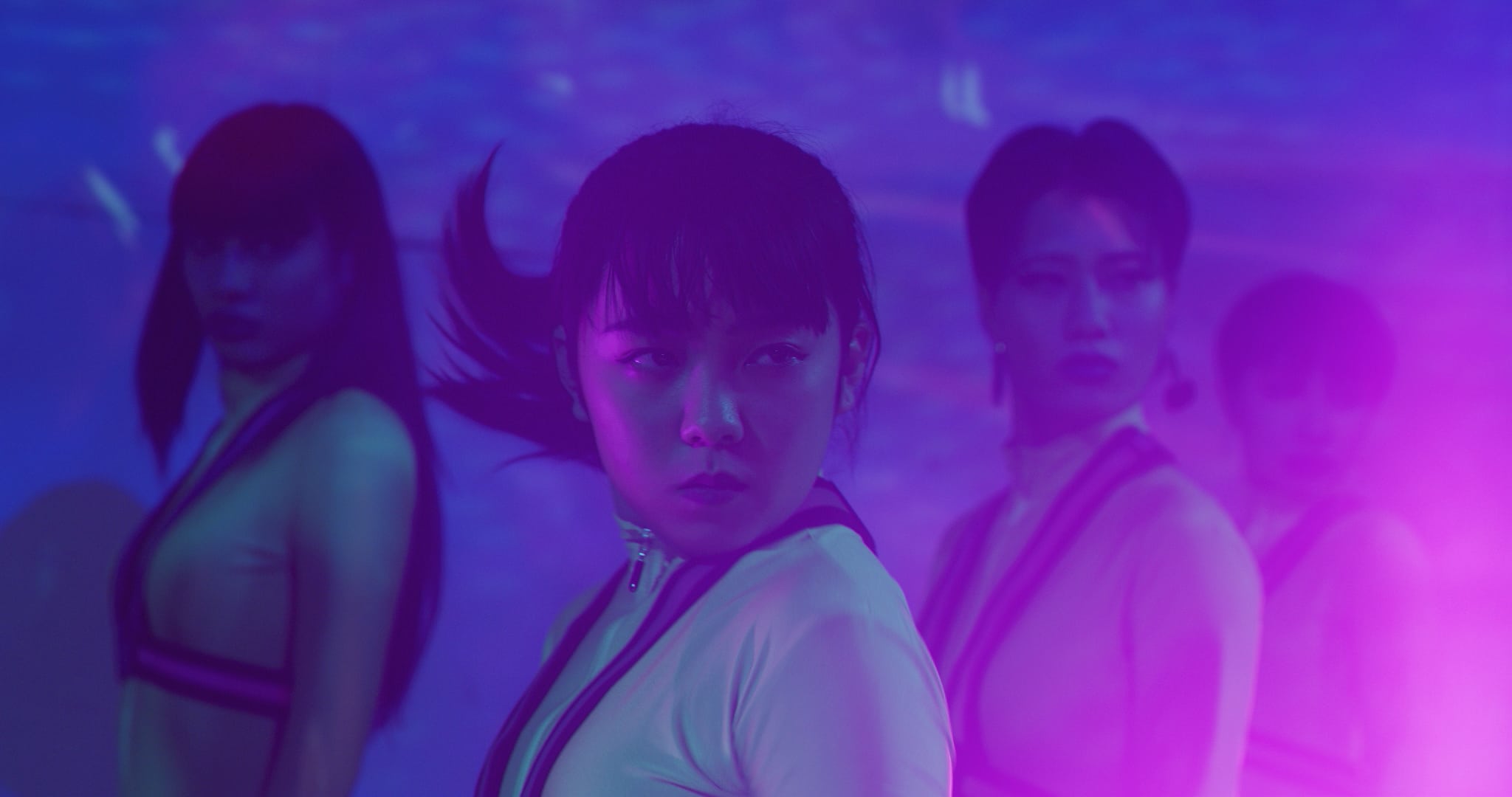
‘Dreams on Fire’ Director Philippe McKie spoke to The Natural Aristocrat about his film launching you into the crossroads of dance, business, and the underground. Truly, what it means to live as an artist, auditioning endless failure for one daylight of success.
This 2021 Fantasia International Film Festival interview contains spoilers.
THE NATURAL ARISTOCRAT [NIR REGEV]: The 3-2-1 winner countdown where Yume loses as ‘Crow’ is one of the most devastating moments in Dreams on Fire. There’s all this classical buildup toward the ‘big competition’ as the film’s climax.
Throw in Yume performing with seemingly a broken foot and in any Hollywood film you’d expect her to win after some suspense. But true to life, Yume’s audition ends in tears. No placement whatsoever. What made you choose that brutal reality based direction for the scene?
PHILIPPE MCKIE: Exactly! I think that it’s this crazy thing where the movies have trained us to think that we are going to win in the 3, 2, 1 countdown. We’ve seen it in the movies so many times.
We are the chosen one. We need to have our own stories. Right?
So in making Dreams on Fire, I wanted to create a story where for once it’s like, ‘Look, you might not win’. You might not win the big gold medal in your first try. So what are you going to do about it? And I think that’s a theme that happens again and again, in the film.
Welcome to the big city. You’re going to get demolished. even children are better at this than you. What are you going to do about it?
I’m really glad that you connected to that scene.
THE NATURAL ARISTOCRAT: Dreams on Fire doesn’t hold back on the modern business concept that talent pales in comparison to social media followers. That your talent holds no value in society without a preexisting fanbase.
Actually, one of the biggest lines for me in Dreams on Fire was when Yume is told, ‘To us, image is just as important as dancing. And even though you’re a better dancer than us, you still can’t join since you lack followers.’
How do you feel about this prevailing idea that you’re essentially nothing as an artist without followers?
PHILIPPE MCKIE: In Japan’s film industry, in my opinion… It’s a big problem in the sense that when you’re looking at the big Japanese films that are coming out over a year, who is being cast it, and the answer is whoever has the most fans. AKA followers.
You’re getting all these leads and all these films that are basically idols, singers, and models. Maybe older actors who are veteran actors.
I’ve personally known so many actors in Japan, up and coming actors, that acting is all they want to do. It’s their life. And I’ve seen many of them give up at a certain point to become an actor.
I shouldn’t even be acting, I should be modeling. You know, I should be trying to like get into like idol gigs or join like an idol group if I want to be an actor. It’s so messed up in my opinion.
In the film, I explore that a little. But in the end I remain optimistic that you can still break through pursuing that craft that you want to do.
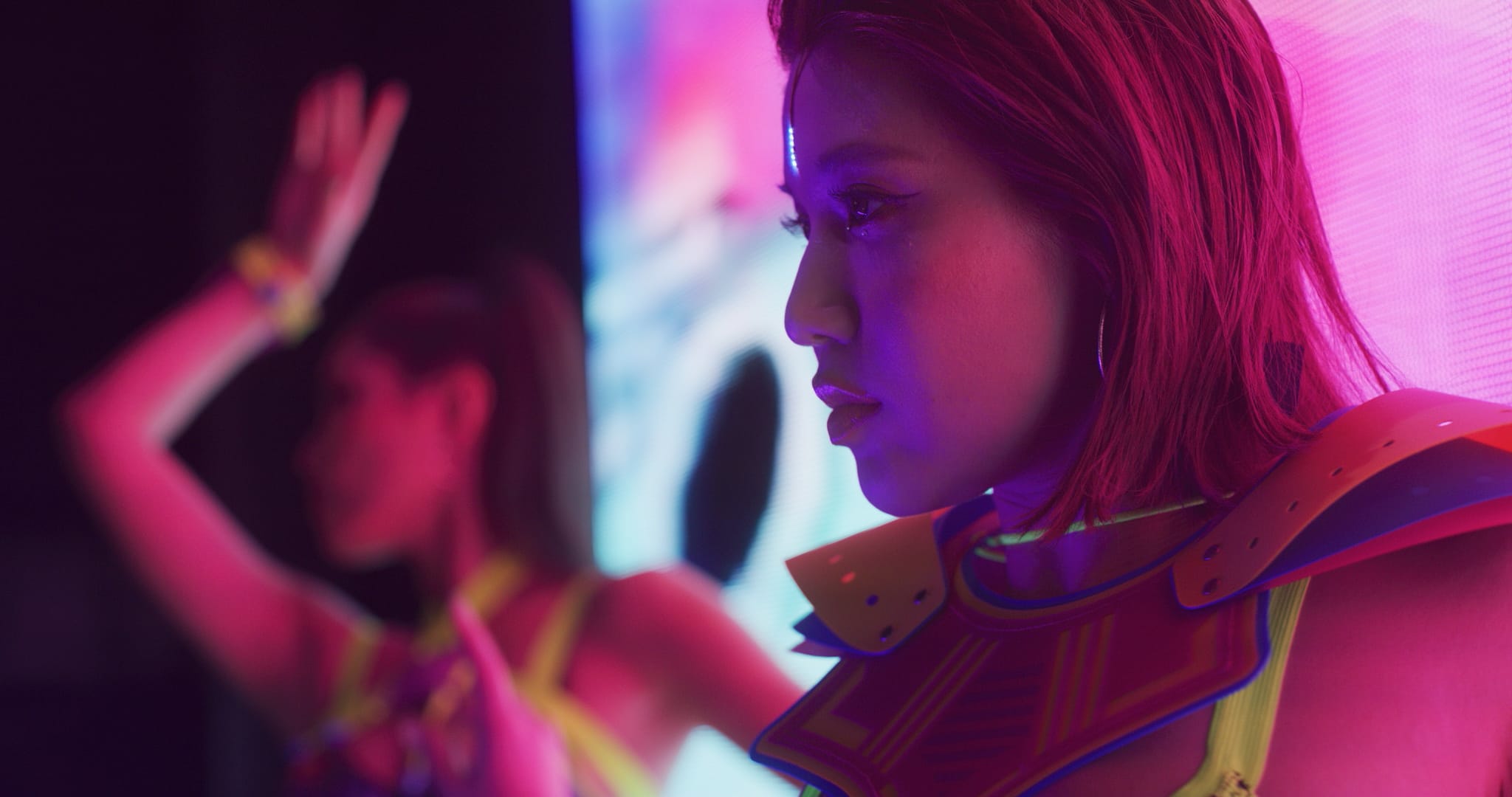
Dreams on Fire Cast – Photo provided by Fantasia
What’s interesting in the film and quite meta is that those girls that are telling that to her, they are playing themselves. Like they are members of a group called Cyber Japan, which is the most famous dancer team in Japan. They basically fly around the world going to EDC, Ultra and all these big electronic music festivals.
They’re flown in to dance in front of the crowd to hype everybody up and each of them has like half a million followers? So to be a part of their group image is more important than their dancing ability. That’s the reality. And so a lot of people in the film are basically playing themselves, which I find kind of interesting.
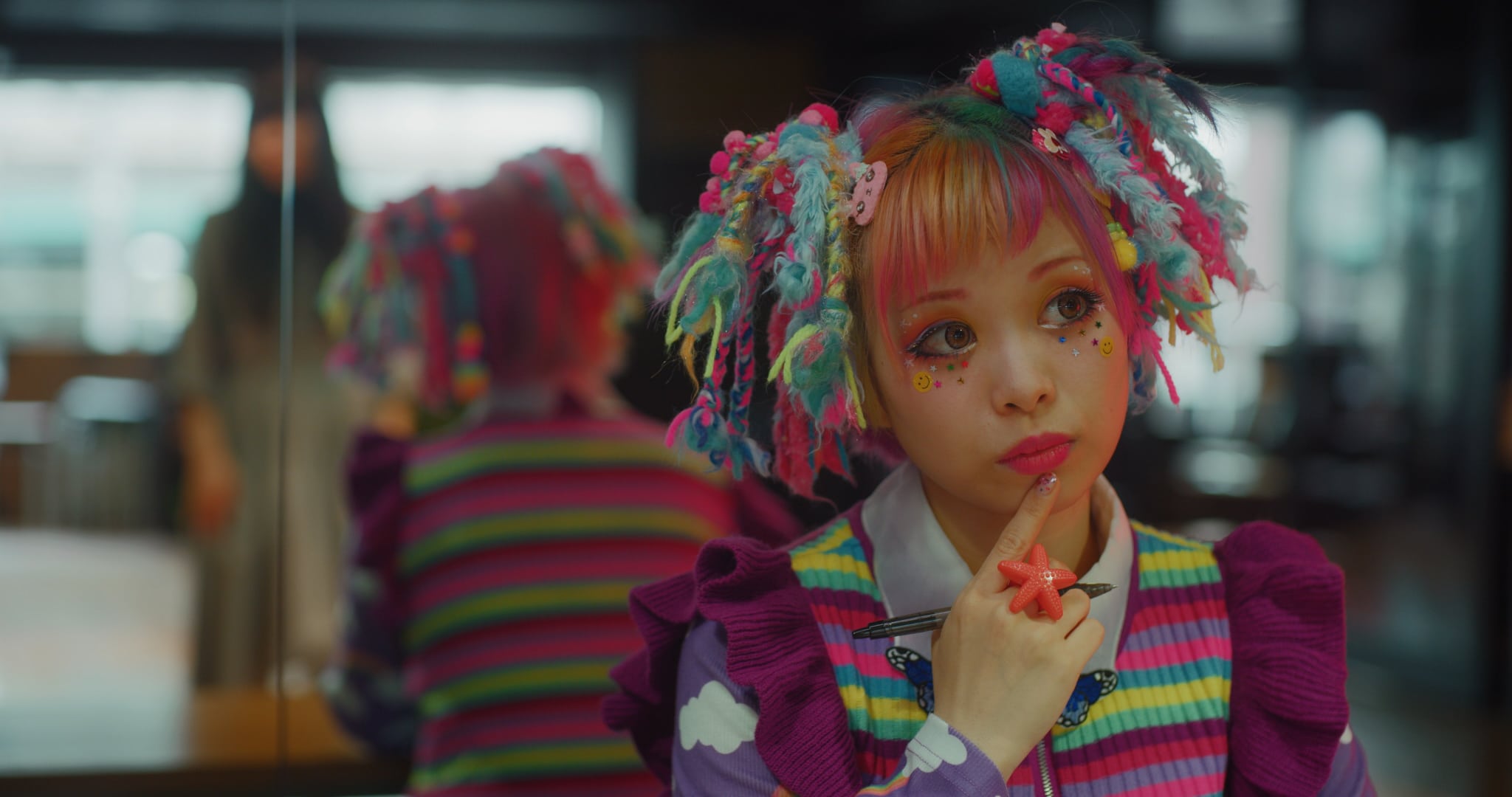
Dreams on Fire – Haruka Kurebayashi as Pop-Star – Photo provided by Fantasia
THE NATURAL ARISTOCRAT: I liked that Dreams on Fire referenced this concept again at Yume’s final audition. Where the Pop-Star’s (Haruka Kurebayashi) manager comments “Oh, you’ve been dancing for five years, but only have 250 followers” I see.
PHILIPPE MCKIE: He’s not even looking at her. Right? That actor, he’s actually, uh, uh, a really established action actor in Japan. He’s fought with Jackie Chan and Jean-Claude van Damme in films.
I know him as this action actor and I was like, ‘Would you be down to play, an a**hole manager?’ And he was down.
THE NATURAL ARISTOCRAT: Dreams on Fire exposes this dark side of pursuing a creative occupation through Yume’s experience at the hostess club. Where without someone else’s financial generosity to support you… You’re at the mercy of shady bosses and fed empty promises with no light on the horizon.
Always at the risk of losing sight of a dream entirely to the growing time demands of what’s supposed to be a ‘side job’.
Do you feel as an artist, that it’s an unspoken rite of passage to live this unattractive early part of the lifestyle? Creatives rarely mention this very real side of the business, even teachers.
PHILIPPE MCKIE: I’m happy you bring that up. I wish that artists talked about it more. I feel like a lot of the big directors or people that make it into pop culture and have really successful careers…
I feel you almost never hear about what happened to them right before they broke out, you know? And I’ve gone seeking that information.
I want to know what these people were living like right before that shift happened. In creating Dreams on Fire, it’s a hundred percent that story. And I’m very open to talk about these things myself.
Ever since day one arriving in Japan, I knew I wanted to make features. And I knew I wanted to be a director in Japan and it took 10 years.
A 10 year hustle to make even my first feature. And so with that experience, I’m infusing it into the work. For sure.
THE NATURAL ARISTOCRAT: I feel you also exposed another unspoken part of society in Dreams on Fire. The financial realities. Without Sakura’s generosity early on, Yume might have never been able to take dance classes consistently.
She might have been stuck in limbo at the hostess club while her dream continued to take a backseat year by year. Left practicing in her claustrophobic net cafe, thus deteriorating her dance skills further.
In your opinion is it even possible to succeed in a creative field without initial financial assistance from parents the like? In Yume’s case, she had zero support from her father which in turn brought her to the hostess club.
PHILIPPE MCKIE: I would say not only parents not being there… But of thinking of home as like a hostile place that Yume doesn’t want to go back to. It’s like, not only do you not have a parachute, but the parachute’s on fire, you don’t want it to land on you. You know?
So I totally agree. You know, coming in to make it… I’ll put it to you this way. I was watching some other films, I don’t want to say names, but I was watching some other films, which are, these stories of someone pursuing their dream. And I’m like, how dare you complain when you’re in this huge apartment?
You’ve got a car, you’ve got all these things. What are you doing to sustain yourself? I was just like, to someone who’s really hustling and who’s coming from a place that they don’t, they have to work on the side and then do their dream… In whatever time they have left.
This is not realistic and this, this is not helping & not inspiring.
So in making Dreams on Fire, I wanted it to have that balance of like, ‘Look, you have this dream, you want to hustle, brace yourself, there’s going to be some sides to it that are not comfortable.’
THE NATURAL ARISTOCRAT: The idea of blacklisting someone from working at all in Tokyo in Dreams on Fire stayed with me. What was the inspiration for Masahiro Takashima’s Hostess Club Owner character? Have you worked for a boss that applies that kind of subtle but openly direct pressure?
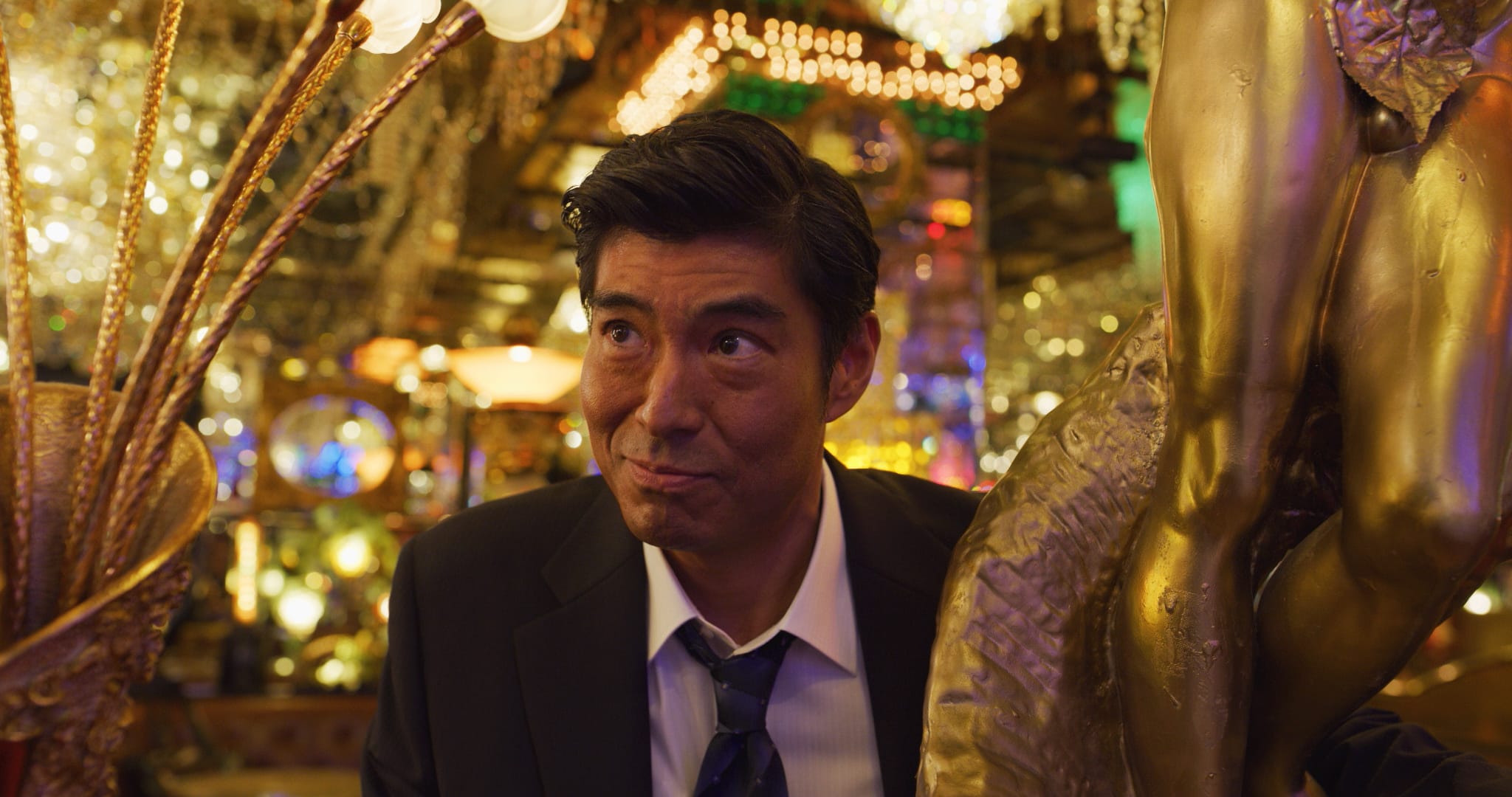
Dreams on Fire -Masahiro Takashima as Hostess Club Boss – Photo provided by Fantasia
PHILIPPE MCKIE: Oh my God. That character is my exorcism of toxic work environments in Japan.
So I love Japan, in fact that’s an understatement. I love Japan! But you know like with anywhere it’s not all roses. There are some dark sides to Japan, just like any country.
I like to think that, where you choose to live, it’s like a relationship and every country is different. Every city is different. None of them are perfect.
You just got to find the one that matches what you’re into. Japan has all these incredible elements, but one aspect, which is really, really tough is the work culture.
Some companies are changing. It’s not the same for all companies, but there’s a lot of people in Japan that are working in like inhuman conditions and are tolerating it because culturally they think that that’s right.
I have worked for… You may say ‘I’ve done my time’ for these s***y part-time jobs and side gigs. And I’ve worked for Japanese bosses who were just like him. They would threaten and scream and just be so, borderline abusive.
They just thought that the workers should take it.
I would be there and I’d say in a calm voice, ‘Don’t scream at me’. And they would be offended.
Like, what do you mean don’t scream at you? You know, I’m your boss. So in writing the script, it was definitely cathartic.
The actor though, Masahiro… He’s majorly famous in Japan, starring in Godzilla films and films before we were born and I have a huge respect for him & his career.
What’s really interesting is that when we got on set and we just started, you know, started shooting, he asked me, ‘Do you want me to go more like scary or funny?’ And I was like, ‘Let’s veer more towards funny.’ I just saw a click in him where he’s like boom!
He chose this road for the character. And I like re-watching the film and seeing the subtlety in a lot of those lines which were threatening. And yet at the same time kind of light and kind of funny. But still, a dagger in Yume’s heart.
THE NATURAL ARISTOCRAT: Yeah, I felt that Masahiro Takashima’s performance was right on the cusp. Especially when he breaks the phone after speaking with Yume.
PHILIPPE MCKIE: Actions done in anger can not be undone!
THE NATURAL ARISTOCRAT: With Yume’s go-go dancing job rejection. I really liked the way it was shot, where the camera captures her looking through the glass towards the main stage… Tears flowing down her cheeks.
It was reminiscent of the visual of a homeless person looking through the window of the fanciest, upscale restaurant in town. It’s just in reach yet it’s still thousands of miles away… What inspired you to shoot Yume’s scene like that?
PHILIPPE MCKIE: Wow… So going into that scene, the actual priorities for me, when I was writing the script, my dream was to shoot this at a specific event called ’06S’ which is the most famous drum and bass event in Japan. ’06S’ is held by the #1 drum and bass DJ in Japan called DJ Aki.
So I was like, ‘Okay, I’m going to aim to shoot at that event and get these real dancers from Cyber Japan. And while writing, I’m like, there’s no way this is going to happen, but I got to try. In the end for the club, I went through some contacts I made as a DJ in Tokyo, and I was able to kind of gain access to the right people to speak to, and able to shoot out in that club.
Then we were able to connect with Cyber Japan and it was a matter of how do we use this space? I had explored the location, I had been there many times as a patron and also as a DJ… But I was like, ‘Can I get access please, to this like secret little VIP booth up there?’ And they said okay.
I basically scouted out the entire club and found this space, which is the one that we see in the film, overlooking the stage. I knew this is it. It’s the kind of thing where you have the script, you have all the intention in the story, but then you are confronted with the reality and the location & what you have.
How do I use this to not only pull off the story but try to enhance it if possible? Everything just came together.
THE NATURAL ARISTOCRAT: How did you originally pitch Dreams on Fire to so many artists from entirely different walks of life? Did everything just kind of work out after Bambi agreed to be part of the film?
PHILIPPE MCKIE: Every single person that appears in Dreams on Fire has a different story as to how we got them onboard. They’re all part of different agencies as well. Let’s start with Bambi [Naka].
So it wasn’t as simple as messaging them on Instagram and being like, ‘You wanna be in my movie?’ You have to go through the right channels.
So I had been a fan of Bambi’s for a long time. People that are into dance, especially in Japan, everybody knows Bambi Naka because she toured with Madonna. She’d reached the absolute pinnacle as a dancer in Japan.
I’d been a fan of hers for years not only as a dancer, but also just her style, her aura as an artist.. She was a muse.
So for a few years I’de been diving deep into the dance world of Japan and going to events, meeting dancers, going to all the top competitions. I went to a dance show where Bambi was the special guest… And because I knew another dancer that was performing that day, I was able to sneak myself backstage. I sneak myself backstage and then almost straight out of a movie, like in the corner, I see Bambi Naka on her phone with an aura.
I go up to her, I bow and I tell her I’m a big fan & a filmmaker. I’d love to work with you someday. I give her my business card, Japanese stuff, and my business card at the time was like holographic. She thought the business card looked super cool and I tell her I hope we can meet again.
So months later I’m casting Dreams on Fire and I made an appointment with her agency to meet with one of her managers. I arrive and we sit and I whip out the very same business card and I give it to her manager. She’s like, ‘Oh s***, it’s you!’ And I’m like, ‘I’m back!’
It just started off in the most awesome way with those really good vibes. And so then she read the script and said, ‘I love the script!’
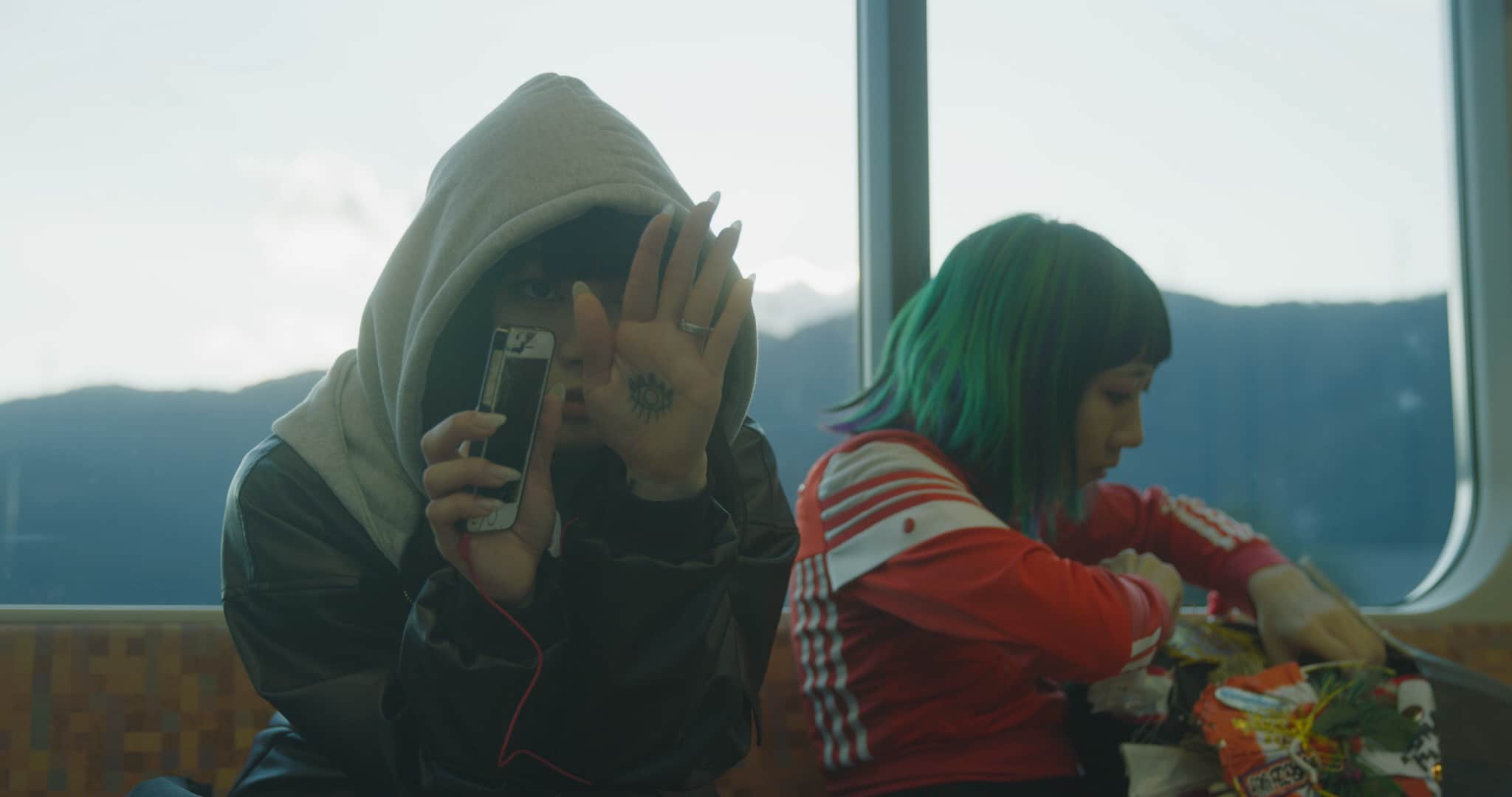
Dreams on Fire – Bambi Naka as Yume, Medusa Lee as ChoCHo – Photo provided by Fantasia
Bambi later told me that when she read the script, she felt that she was the only one that could do it. She had like that drive and that confidence. And once I knew that when she got on board, I actually rewrote the script.
I tweaked it to make sure that it would fit this Bambi Naka. So that’s the tale of how we got her.
THE NATURAL ARISTOCRAT:I was wondering with Sakura actress Okuda Saki, since so of many actors in the film are loosely playing a version of themselves… Was the scene where she runs off from the hostess club after a custom uncovers her adult video past how she really feels about it?
PHILIPPE MCKIE: In Japan, eroticism is accepted as being a part of the human condition. And there’s a lot less taboo around sexuality and being an adult actress. Actually in some ways, sometimes it’s prestigious in Japan.
So in particular with her, what’s really cool is that she also does theater. She even directs theater. And so I actually was first exposed to Okuda Saki through seeing her on stage in a theater play and then hearing these rumors and rumblings.
‘Did you know she’s actually a famous adult actress?’ and the like. I felt that was super interesting.
When I approached her, I was like, ‘Look, I have a role that I have made with you in mind. I know that you love theater and that you are a professional adult video actress’, and she dug it and she was down to join. I think that actually in reality, she has no shame.
There’s nothing to be ashamed of in her career as an actress. However, I have known other sex workers in Japan that were like Sakura and that didn’t want it to be known to people they were just meeting. Or even people that they were close to for a while.
They wanted to keep that a closed part of their identity. And so in that sense, Sakura is more inspired by other people I’ve known that worked in the adult video industry, as opposed to Okuda Saki, who is actually like super proud about her prestigious career.
THE NATURAL ARISTOCRAT: When Yume pets the crow in the alley, it looked like a real crow to me. If it was real and not CGI, how did you manage to get it to stay calmly in place like that for the whole shooting sequence?
PHILIPPE MCKIE: Oh man! So all the animals in the film are real, including the humans. (laughs) Crows are something that you always see when you’re heading out of the club at 5:00 AM in Tokyo, the first thing you hear is the crows. They are like the inhabitants of the city.
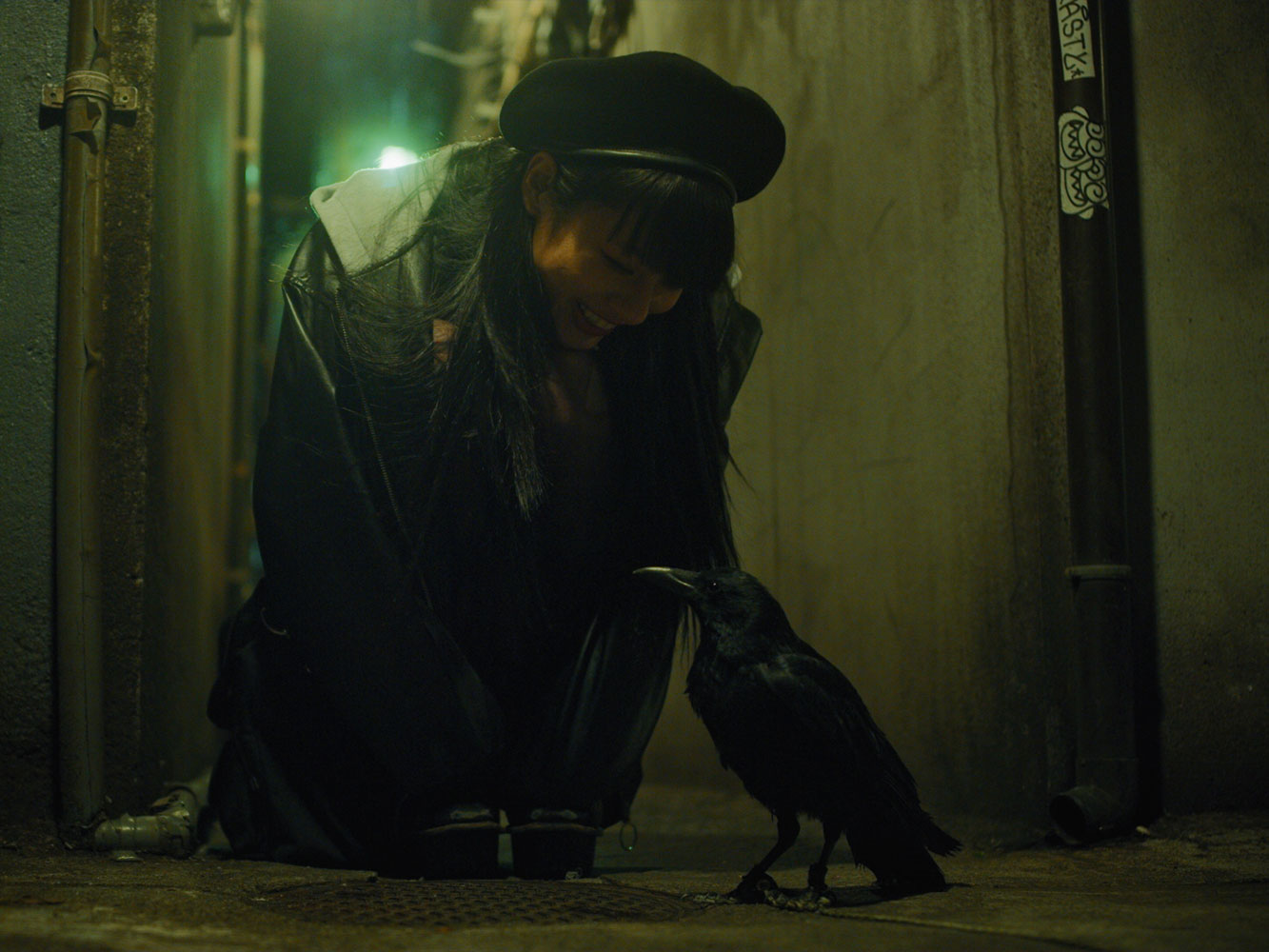
Dreams on Fire – Bambi Naka as Yume – Photo Credit: Dream on Fire
So I found a person who owned a Crow and we worked together to have them bring their Crow into this famous area in Tokyo called Golden Gai, which has a drinking area and we talked. We were shooting that guerrilla, we’re shooting guerrilla in this like crazy area, which is notorious that they will quickly tell you to stop shooting and you got to get out of there.
But with the Crow and Bambi, the planning had to be perfect.
We were like the SWAT team. All right, we’re going to walk in.
You’re going to be first. You’re going to be last. You’re going to be like blocking the entrance and exit to this little alley, like pop up up.
And then we went in to take one shot. Got it all. And then, boom, we’re done! Real corrupt. (laughs)
THE NATURAL ARISTOCRAT: Was the idea behind shooting so many train platform scenes supposed to subtly be hinting every relationship is fleeting and temporary?
PHILIPPE MCKIE: Whoa, that’s a very cool read! One thing that I love about art in general and something like film, is you’ve got all these art forms that are like coalescing into one life form. So many artists working together.
I think there’s always some magic that is created in the mind of the audience. Which is maybe not the intention of the director in the case of the train platforms.
I guess for me, that’s something that’s like representative of living in Tokyo where almost no one has cars. Everyone is getting everywhere by train. And that’s like a part of life.
Tokyo is just like a crazy mega city where each of these stations, like each area, the center is the station and they feel like different ecosystems. We’ve got different people that gather around these different stations.
Shibuya is a famous example. I feel trains is a part of Japan and there are a lot of train lovers in Japan. Sometimes you’ll be passing on train, you’ll see a group of salary men of their crazy cameras that are just there to catch this one train at the right time, you know, on the right bend of the track.
In Dreams on Fire, there’s the Irish bar scene. And in that bar, like that’s the place that I would go from time to time alone, just to like meditate and practice my Japanese. I would always try to spark a conversation. And this one time I met this, this Japanese man and I said ‘What’s your thing?’ over a pint of Guinness.
He said it was his hobby is to listen to the sound recordings of different trains in Japan. And that he’s part of this community of people that like go out in trains of sound recorders and just listen to trains as ASMR. And we know every different model.
‘You make me listen to a train and based on even the whoosh of the doors I’ll know what train it is.’ And at that moment, I was like, holy s***, that sets the bar high for when I’m shooting trains! Wholly grabbed me scared.
I feel like trains are a very big part of Japan and it’s a representative of Tokyo. And it’s also representative of Yume’s journey of going back from the city into the countryside and nature for that big competition at the end.
THE NATURAL ARISTOCRAT:: The girl who first hands a water bottle to Yume when she’s at her lowest, dancer/actress Shizuku Yamashita, actually ends up being one of the film’s most impactful characters. There wasn’t a lot online about Shizuku and I was wondering how she was cast for the role?
PHILIPPE MCKIE: When I was planning on shooting Dreams on Fire, you know how ChoCHo in the film was having problems with her visa? That’s a reality for any foreigner in Japan, including myself, including the actress that played ChoCHo.
Her name is Medusa Lee. We almost lost her right before the shoot because of visa issues. I’m like no freaking way that we’re going to have this like meta issue with this character!
Then I had a visa that was coming to an end myself… I just had like a couple months left and I’m trying to shoot a feature, but in a couple of months. I’m not even able to be here anymore.
So we had planned the first days of the shoot and then bam, there were some issues with certain members of the cast at the time. I had to scrap the shoot and then come back to Canada for like a few months and then return to Japan to shoot.
When we were planning that original shoot, one of the first things we’re going to shoot with this battle event at the beginning of the film. And I heard about this girl who lived in Nagoya, completely different city, who was going to come to Tokyo just to be an extra in the film.
I was like ‘Whoa!’ Like respect, you know? So I looked into her and realized, ‘Wow this girl, who at the time of shooting was just 13, had already performed on stage with some of the most famous Japanese dance crews. This girl is an incredible dancer. She’s crushing it.
And she wanted to come all the way to Tokyo just to be an extra at a battle event. You know, she’s got that yearning. So I created the character of Shizuku for her.
It’s this person that I just met that I wanted to infuse into the film. But for me, her character represents that when we have a dream and we’re like striving for something. Especially if it’s something like film, which requires a team, there’s sometimes people that are close to us that are collaborating with us.
I have a couple good friends, including the sound designer of the film, Remy Sealey, that did the entire sound mix of the film, all the sound design. We’ve been working together since day one, since film school. For me, at the end, she’s saying thank you. And that’s me wanting to thank her in a way, a way to embrace her drive to be in the film.
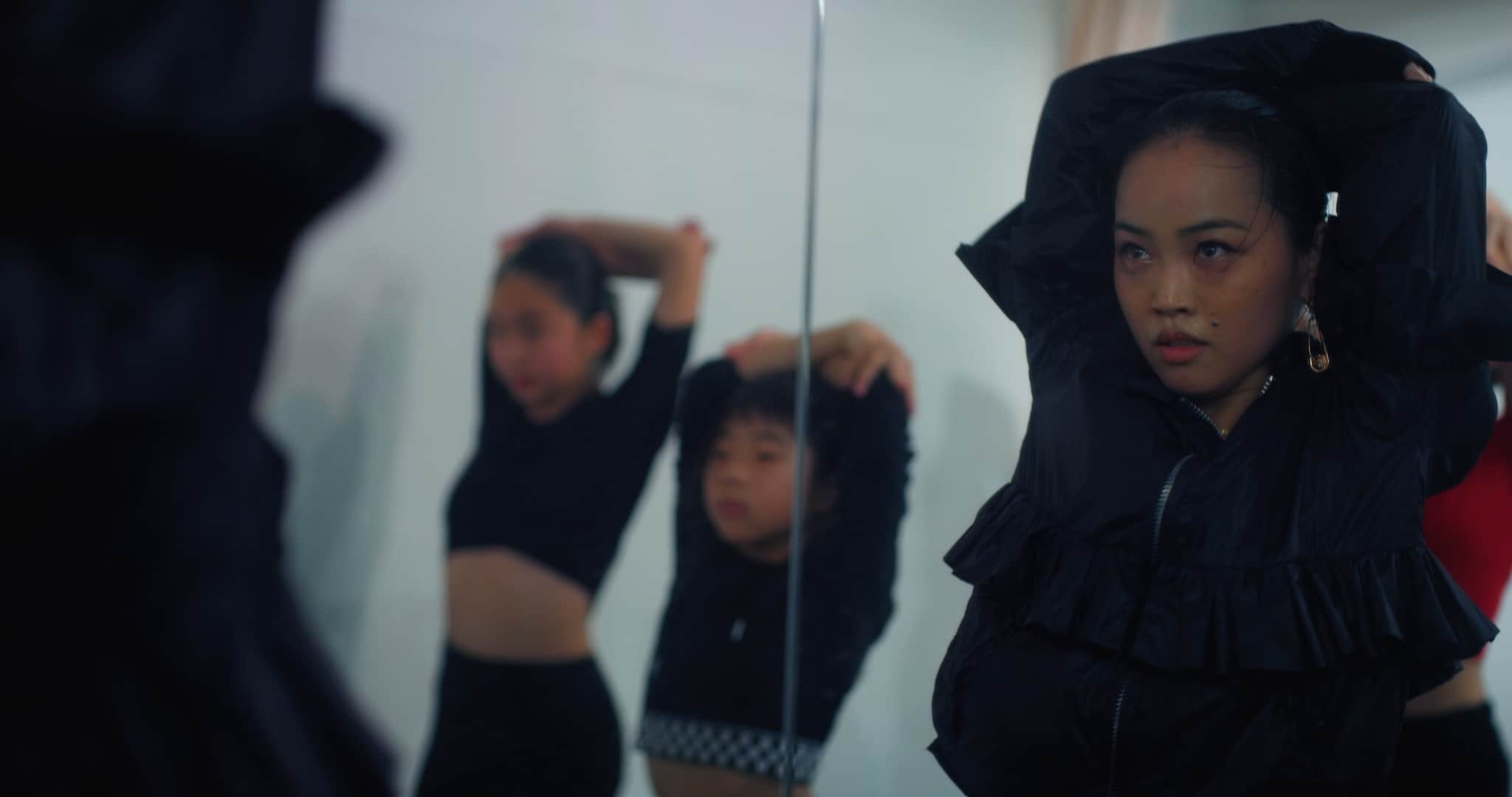
Dreams on Fire Cast – Photo provided by Fantasia
THE NATURAL ARISTOCRAT: You were able to truly immerse the audience in the crushing feeling of a performance rejection in Dreams on Fire Is there something you drew in your own life for inspiration?
PHILIPPE MCKIE: Back when I was dancing it was really pure and it was just me going to battle events. I was doing breakdancing and tango simultaneously. I was going to battles and the worlds are quite different.
The age groups were kind of different too. So I’d go to these breakdown battle events where it’s just like anyone enters the circle and just busts a move, you know?
This is before the social media days. So that badge of honor is just in your heart and mind, it’s not going to be posted anywhere. Know what I’m saying? Then doing tango and doing choreographies of tango and even mixing in some breakdancing elements.
But again, it was just being part of that community. I was not seeking to be a professional dancer myself in those days. So it was really just like pure out of a love of dance.
But I feel it now as a filmmaker… Meeting producers and just pitching projects, it’s very different, but I’m still familiar with the crushing sense of trying to convince someone that you’re the one for the job.
THE NATURAL ARISTOCRAT: With Bambi Naka’s Yume, was it intentional that at the beginning she would mostly use hand movements and gradually build towards the lower body? I felt that was intentional since Yume simply didn’t have space to practice until she looked at that outside mirror.
PHILIPPE MCKIE: Yes, a hundred percent! You got it. And I’m very happy that you did.
So when me and Bambi were talking about the character, we’re like, ‘Okay, so she’s living in the countryside and her grandfather is in the other room. So she’s learning to dance off of YouTube and off of her phone and off of social media.’
We just imagined Yume in her room, just like she’s doing in her internet cafe. She could only use her upper body and sure enough, as she gets to Tokyo and she starts to get exposed to these different dance styles… Yume starts to absorb them and in the end, go with this whole body performance.
THE NATURAL ARISTOCRAT: Were Rinomaru’s dance lessons from Yume in the film based in reality?
PHILIPPE MCKIE: All of them are incredible dancers. It was really funny actually. I was like, ‘Tone it down! No, no, you gotta be worse!’
But the idol world is like a whole other crazy universe, which I just begin to touch on in the film. They work crazy, super hard and she does too. Yeah.
I wanted to show that when we see these girls on stage, these idols, they’re supposed to be like enlightening your spirit. They’re singing about these like light themes to like infuse you with energy often.
But they’re working so hard, sweating and dancing every day of the week, training endless hours for those performances. And sometimes there’s bullying and management issues.
All kinds of crazy things are going on behind the scenes.
THE NATURAL ARISTOCRAT: The closing credits music and animation is one of the best combinations I’ve seen. In general the electronic Drum and Bass music especially in the club scenes gives this atmosphere of the cutting edge.
PHILIPPE MCKIE: That’s from a German beatmaker named Stahl. * Editor’s Note: Track is named “Know You” (Instrumental Single Version).
Oh man. All the musicians in Dreams on Fire are guys making cutting edge electronic music. I feel like if this was 10 years ago or earlier, they would be blowing up.
But it’s quite meta. It connects to Yume’s journey. Where it’s like ‘Welcome to this new era, where now the entire planet is connected and your competition is like a hundred fold!’
And just being discovered is a challenge in itself. And so with Dreams on Fire, I like, hand-picked all these different artists that I love and showcase them in the film.
THE NATURAL ARISTOCRAT: Thank you!
PHILIPPE MCKIE: Thank you!
More Dreams on Fire movie coverage:
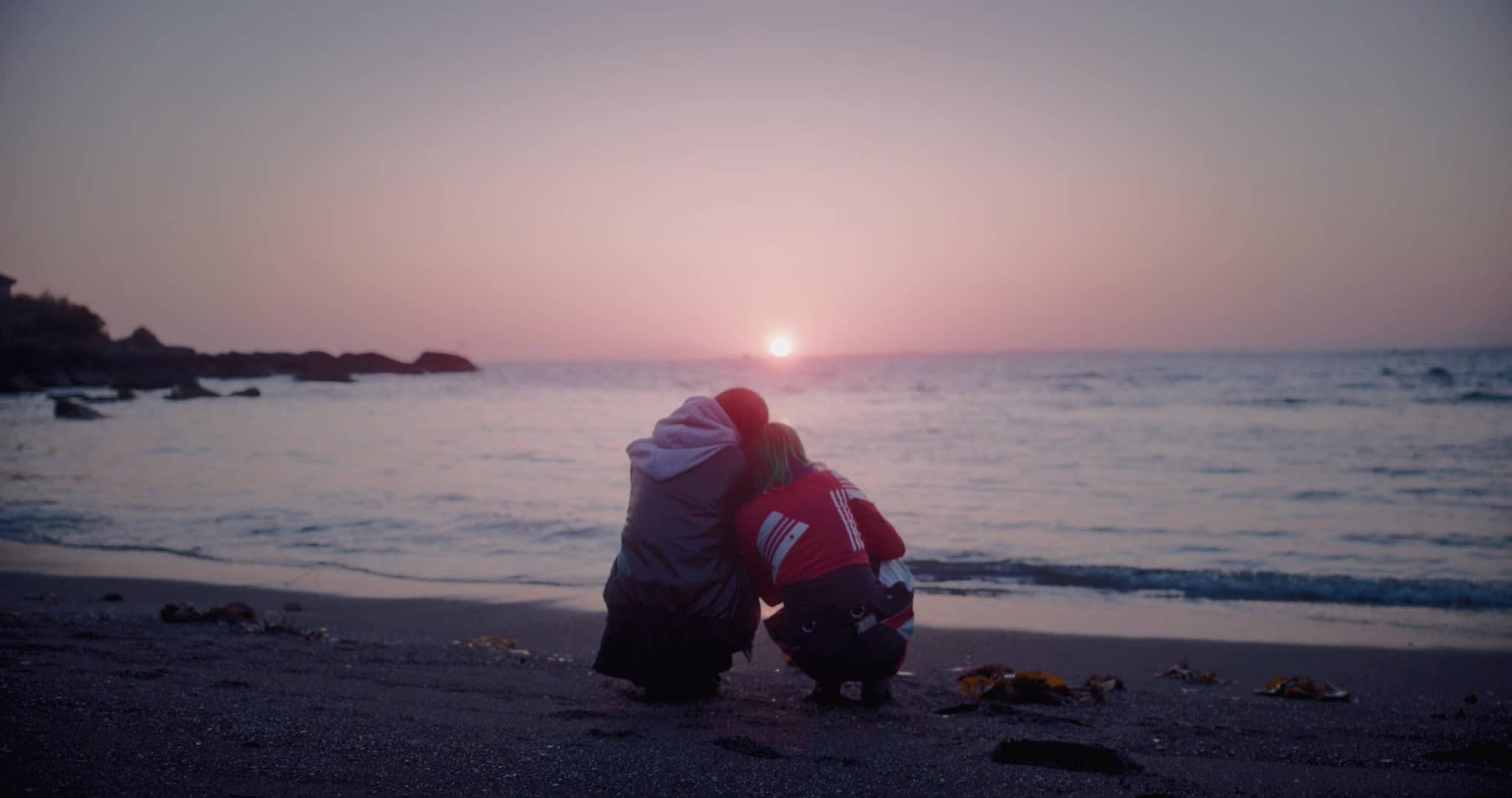
Dreams on Fire – Bambi Naka as Yume and Medusa Lee as ChoCHo – Photo provided by Fantasia
– Be sure to check out our exclusive Bambi Naka Interview on Dreams on Fire & Yume fulfilling her dream!
– Read our Dreams on Fire film review where we look at Yume meeting the harsh reality of success.
Juggling her job as a hostess in Tokyo to support a dream while integrating herself into the underground dance community. Yet in the end, escaping her families wishes and fleeing to Tokyo ends up being the right call… As Dancer Yume is met with fate by never giving up.
– Want to learn more about the Dreams on Fire movie and watch its incredible dance scenes? Go to Fantasia International Film Festival. Dreams on Fire was an official selection as well at Glasgow Film Festival 2021 and Dublin International Film Festival 2021.
– Did you know: Director Philippe McKie is also the screenwriter of Dreams on Fire.
Nir Regev is the founder of The Natural Aristocrat. You can directly contact him at [email protected] for coverage consideration, interview opportunities, or general comments.

You may like
-

Unmute Unmute 
Unmute Unmute 5 Movies to Watch at the 2024 Fantasia Film Festival
-
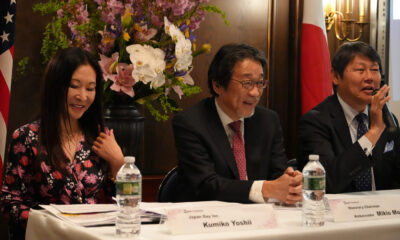

Photos: Japan Parade 2024 Preview Event in NYC (April 26)
-
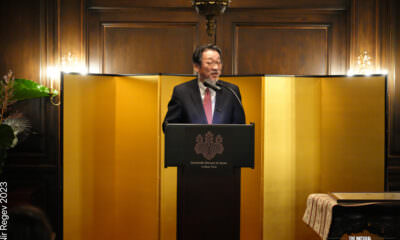

Ambassador Mikio Mori: Anime NYC Commendation Speech
-
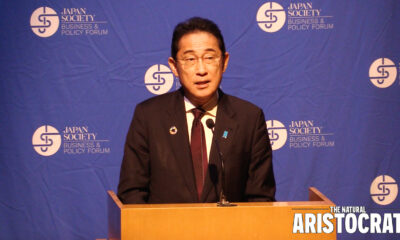

Japan Prime Minister Fumio Kishida Speech @ Japan Society NY
-


Bill Gates talks Global Health at Japan Society NYC (Video)
-
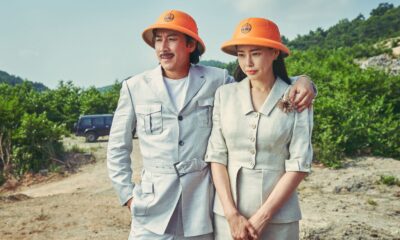

Fantasia 2023: ‘Killing Romance’ Movie Review, Pros and Cons
